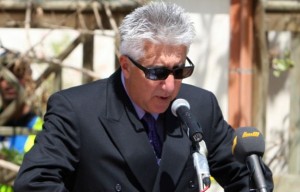 In what appears to be the first diplomatic casualty from the latest WikiLeaks revelations, the U.S. ambassador to Libya has returned to Washington and is likely to leave his post, U.S. officials said Tuesday.
In what appears to be the first diplomatic casualty from the latest WikiLeaks revelations, the U.S. ambassador to Libya has returned to Washington and is likely to leave his post, U.S. officials said Tuesday.
Ambassador Gene Cretz (right) , a veteran American diplomat, authored several secret cables to Washington that speculated on long-time Libyan leader Moammar Gadhafi’s health, and described his personal proclivities, including his reliance on a “voluptuous” Ukrainian nurse.
The documents are among about 2,000 that have been publicly released from a cache of more than 250,000 State Department cables obtained by WikiLeaks.
While the Libyan government has not commented publicly on them, the leaked cables can only have complicated Cretz’s task in dealing with the notoriously prickly regime in Tripoli, which the mercurial Gadhafi has ruled since a 1969 military coup.
A senior State Department official said that the WikiLeaks revelations were not the only reason for Cretz’s return, noting the frustrations of U.S.-Libyan ties.
“It’s a complicated relationship, and WikiLeaks just added to that complication,” said the official, who requested anonymity because no announcement has been made on Cretz’s status.
State Department spokesman P.J. Crowley told reporters that Cretz had returned to Washington for consultations. “One of the issues to be discussed will be, you know, when he goes back,” Crowley said.
Current and former American officials have bemoaned the WikiLeaks disclosures’ potential impact on Washington’s foreign policy. Sources are less likely to approach American diplomats with sensitive information if there is a risk it will end up in the public domain, they say.
Already, there are anecdotal reports that foreign leaders have circumscribed meetings with U.S. envoys, insisting in some cases that note-takers or other American staff be excluded.
“Obviously, this has been a difficult period for a lot of U.S. diplomats,” said David Mack, a retired State Department official who served in Libya and traveled there recently, where he was told the storm from Cretz’s leaked reports would blow over.
U.S. ambassadors and other diplomats are expected to report frankly on political and social conditions in the countries where they are posted, including such sensitive matters as the health and personal habits of leaders. But until WikiLeaks, those cables didn’t become public until decades later, if at all.
“Diplomats in the field owe the governments that send them there the right to expect both accurate reporting and candid assessments,” Mack said. “And if the WikiLeaks affair makes that less likely, diplomacy will suffer.”
Cretz, who in November 2008 became the first U.S. ambassador to Libya since 1972, wrote in a leaked September 2009 cable, entitled “A Glimpse Into Libyan Leader Gadhafi’s Eccentricities,” that “Gadhafi relies heavily on his longtime Ukrainian nurse, Galyna . . . who has been described as a ‘voluptuous blonde.’”
“He also appears to have an intense dislike or fear of staying on upper floors, reportedly prefers not to fly over water, and seems to enjoy horse racing and flamenco dancing,” reported the cable, written as the Libyan leader prepared to travel to New York for the annual U.N. General Assembly.
Gadhafi “has been described as both mercurial and eccentric, and our recent firsthand experiences with him and his office, primarily in preparation for his UNGA trip, demonstrated the truth of both characterizations,” Cretz wrote.
Another cable, written three months earlier, reported that rumors of Gadhafi’s suffering from cancer were “unreliable,” but that the leader had hypertension and was a borderline diabetic.
“Gadhafi was described as ‘a hypochondriac,’ who insisted that all examinations and procedures be filmed and then spent hours reviewing them with physicians whom he trusted,” the ambassador reported.
A series of cables from the U.S. Embassy in Tripoli described a dramatic standoff over the fate of Libya’s 11.4 pounds of highly enriched uranium, which can be used to fuel nuclear weapons. Shipment of the material out of Libya for disposal in Russia was halted at the last minute.
One cable quotes Gadhafi’s son, Saif al-Islam, as saying the shipment was held up because the Libyan regime was “fed up” with the slow progress in U.S.-Libyan relations. The highly enriched uranium eventually left Tripoli on Dec. 21, 2009.
Cretz, a native of Albany, N.Y., served in numerous Middle East and South Asia postings, including India, Pakistan, Syria, Egypt and Israel, where he was the deputy chief of mission from 2004 to 2007, according to his State Department biography. He speaks Dari, Urdu, Arabic and Chinese.
By Charles Homans

Leave a Reply
You must be logged in to post a comment.